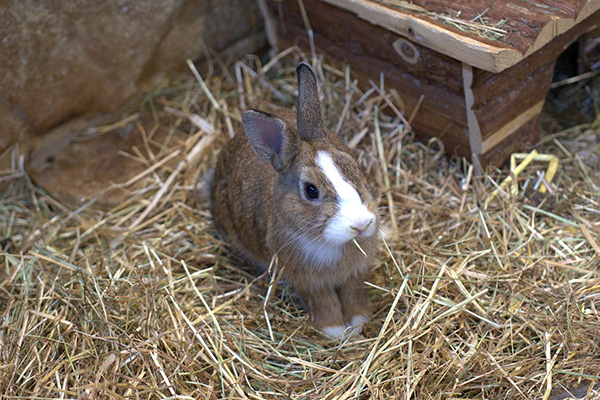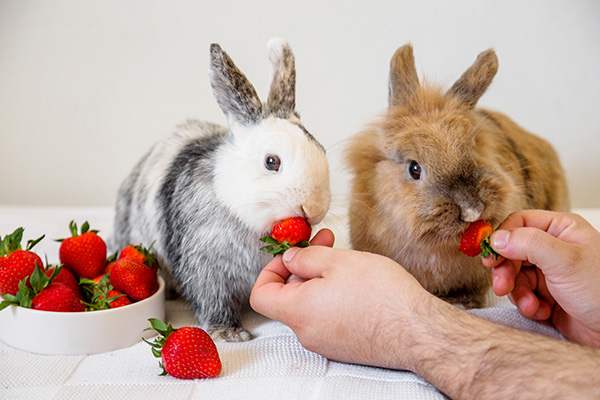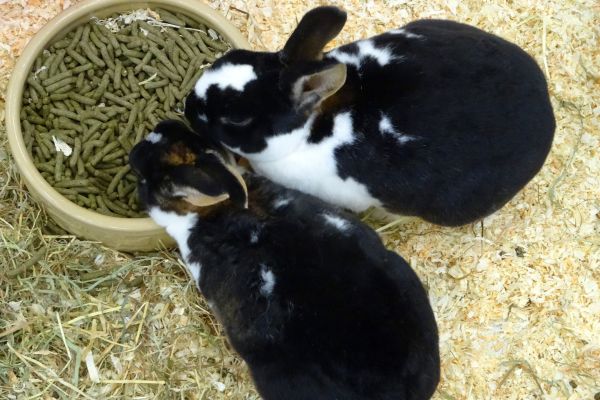Knowing what rabbits eat is crucial for their health and well-being. A balanced rabbit diet is crucial for maintaining their digestive health, dental health, and overall happiness. In this guide, we will explore the key components of a rabbit’s diet and provide tips for maintaining a balanced nutritional plan for your pet rabbits.
Primary Food Sources
Hay

Fresh hay should make up about 85% of a rabbit's diet, serving as the cornerstone of their nutrition. It offers essential fiber that is vital for promoting healthy digestion and preventing gastrointestinal issues like GI stasis. Moreover, chewing good quality hay aids in naturally wearing down a rabbit's continuously growing teeth, thereby preventing dental issues such as overgrowth and malocclusion.
Types of Hay:
Timothy Hay: This is the most recommended type of hay for adult rabbits due to its high fiber content and low protein levels. It supports healthy digestion and is ideal for daily feeding.
Oat Hay: Rich in fiber and beneficial for rabbits' dental health, oat hay is another good option. Its varied texture can also add some variety to a rabbit's diet.
Alfalfa Hay: Suitable for young rabbits due to its higher protein and calcium content, but it should be limited for adults to avoid excess weight gain and urinary issues. Young rabbits under one year old can be initially fed alfalfa pellets but should transition to grass hay as they mature.
Fresh Grass
Allowing rabbits to graze on fresh grass offers additional benefits. Grazing provides a natural source of nutrients and the opportunity for rabbits to engage in their natural foraging behavior, which is mentally stimulating and physically enriching. Fresh grass helps wear down their teeth, similar to hay and provides hydration and additional nutrients.
Leafy Green Vegetables
Leafy Greens
Fresh leafy greens should make up about 10% of a rabbit's diet, providing essential vitamins and minerals. Gradually introducing new greens is essential to prevent digestive issues and monitor for adverse reactions. Suitable leafy greens include:
Romaine Lettuce: A staple in a rabbit’s diet, offering hydration and essential nutrients without the risk of high calcium levels found in other types of lettuce.
Kale: This offers a wealth of vitamins A, C, and K, making it a nutritious choice. However, due to its elevated calcium levels, moderate its consumption.
Arugula: A flavorful green that provides variety and essential nutrients.
Spinach: Rich in vitamins and minerals, spinach can be offered occasionally, but it's oxalate content may inhibit calcium absorption if consumed in excess.
Other Vegetables
In addition to leafy greens, other vegetables can be offered to provide a balanced diet. These should be given in moderation and not all at once to monitor for any adverse reactions. Suitable vegetables include:
Bell Peppers: Rich in vitamins A and C, bell peppers add variety and nutrients to a rabbit’s diet. Remove the seeds before feeding.
Carrot Tops: Carrots' leafy greens are a good source of vitamins and should be fed more often than the carrot root itself due to their lower sugar content.
Radish Tops: These leafy greens are nutritious additions that can be included regularly in a balanced diet.
Zucchini: Low in calories and rich in vitamins, zucchini can be fed regularly as part of a balanced diet.
It is essential to wash all vegetables thoroughly to eliminate any pesticides or contaminants before offering them to your rabbit.
Fruits

Rabbits have a sweet tooth, and fruits can be a delightful and nutritious treat for them, but they should be eaten in moderation due to their high sugar content. Here are some safe fruits that can be used as occasional treats:
Apples: Apples are a good source of vitamins but should always be given without seeds, as apple seeds contain cyanide, which is toxic to rabbits.
Bananas: Bananas are a delicious treat packed with potassium. However, due to their high sugar content, they should be offered in moderation.
Berries: Blueberries, strawberries, and raspberries are all safe for rabbits and are packed with antioxidants. These small fruits can be given whole and are easy for rabbits to handle and enjoy.
Melons: Watermelon, cantaloupe, and honeydew melons are hydrating and nutritious. Ensure the seeds are removed before offering them to your rabbit.
To avoid digestive issues and excessive sugar intake, fruits should only make up a small portion of your rabbit's diet. The advised portion is one to two tablespoons of fruit per 5 pounds of body weight, provided once or twice weekly.
Herbs
Adding herbs to a rabbit's diet can provide variety and additional nutrients, enhancing their overall health and well-being. Here are some common herbs that are safe and beneficial for rabbits:
Basil is rich in vitamins A, K, and C and essential minerals like calcium and iron. It possesses anti-inflammatory properties and supports digestion. Provide fresh basil leaves as a treat, but ensure the leaves are clean and free from pesticides.
Cilantro is packed with antioxidants and vitamins A, C, and K. It also has a refreshing taste that many rabbits enjoy. Cilantro can be fed frequently but in small amounts to avoid any potential digestive upset.
Dill contains essential nutrients such as vitamin A, vitamin C, and iron. It can aid in digestion and has soothing properties. Fresh dill can be given to rabbits occasionally, as its strong flavor means a little goes a long way.
Mint is a good source of vitamins A and C, and its aromatic properties can help freshen a rabbit's breath. It also aids in digestion. Offer fresh mint leaves sparingly, as too much can cause digestive upset.
Parsley is abundant in vitamins A, C, and K, iron, and folate. It supports immune health and has diuretic properties. Parsley can be given more frequently than some other herbs, but always in moderation to prevent excessive calcium intake.
Rosemary contains antioxidants and anti-inflammatory compounds, and its antimicrobial properties can support overall health. Because of its potent flavor, rosemary should be offered in small amounts and as an occasional treat.
Pellets

High-quality rabbit pellets support a rabbit's diet and should comprise about 5% of their daily intake. These pellets are formulated to provide essential nutrients that may not be sufficiently obtained from hay and fresh vegetables alone. However, their consumption should be limited to ensure that the rabbit's diet primarily comprises high-fiber foods.
For an average adult rabbit, feeding a small portion of pellets is recommended, typically around 1/4 cup per day. This amount helps provide necessary vitamins and minerals without contributing to excess calorie intake, which could lead to obesity and related health issues.
When choosing rabbit pellets, it's crucial that they do not contain added sugars, artificial colors, or preservatives. High-quality pellets should list high-fiber ingredients such as Timothy hay, grass hay, or oat hay as the primary component. Avoid pellets that include corn, seeds, or nuts, as these can harm rabbits and not contribute to their nutritional needs.
Foods Rabbit Should Avoid
Chocolate: Chocolate contains theobromine, a substance that is toxic to rabbits. It can cause serious health issues, including heart problems and even death.
Avocado: Avocados contain persin, a substance that can be toxic to rabbits. Eating avocado can lead to breathing problems, heart failure, and death.
Onions and Garlic: These vegetables can cause hemolytic anemia in rabbits, leading to weakness, dizziness, and potentially fatal complications.
Iceberg Lettuce: Iceberg lettuce contains lactucarium, which can harm rabbits in large quantities. It can cause diarrhea and other digestive problems.
Rhubarb: Rhubarb contains oxalic acid, which is toxic to rabbits. Ingesting it can cause severe digestive upset, kidney damage, and potentially fatal complications.
Potatoes: Potatoes, especially the green parts, contain solanine, which is toxic to rabbits. Additionally, their high starch content can disrupt a rabbit's digestive system.
Bread, Pasta, Cookies, and Crackers: These high-carb foods can cause digestive issues in rabbits and lead to obesity and related health problems. Rabbits' digestive systems cannot handle large amounts of starch and sugar.
Sugary Processed Foods: Foods with high sugar content, such as candies and sodas, can cause severe digestive issues and obesity in rabbits. These foods can also cause dental problems.
Nuts and Seeds: Nuts and seeds are rich in fat, which can cause digestive issues for rabbits and pose a choking hazard.
Beans and Peas: These legumes can induce gas and bloating in rabbits, which can be highly uncomfortable and potentially hazardous for their health.
Hydration
Fresh water is important for rabbits and should be readily available to ensure they stay hydrated and healthy. Adequate hydration is crucial for their digestive system, helping to move food through their gut and prevent issues such as GI stasis. Additionally, water is vital for maintaining kidney function and overall bodily health.
